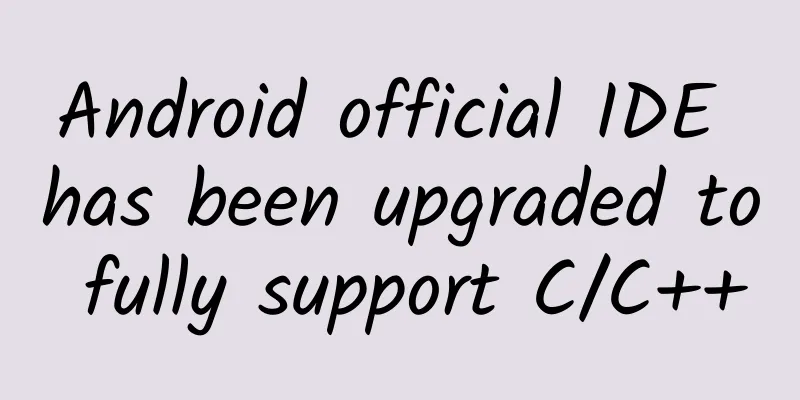Android official IDE has been upgraded to fully support C/C++

|
Google has revealed the next version of Android Studio 1.3 preview, which will not only fully support C language code editing, but also speed up the execution of Gradle automated build tools and add new memory analysis tools. In addition, Google also released the 1.0 of the mobile web development tool Polymer and provided a cloud test laboratory for developers to use. Google revealed at the 2015 Google I/O conference that the next version of Android Studio will have a major update, and the 1.3 version will begin to fully support C and C++ languages. Google's web development tool Polymer has also officially entered 1.0, and Google has promised to support the iOS dependency management tool Cocoapods, allowing iOS developers to more easily integrate Google service SDKs. In addition, Google has also released a cloud testing laboratory that allows developers to upload apps to test compatibility on multiple devices. Android Studio was first unveiled at the Google I/O conference two years ago, but the official version 1.0 was not released until the end of last year. This IDE is based on the common Java integrated development environment IntelliJ IDEA, can integrate with the Google Cloud Platform, and supports the development of apps for various Android platforms. The latest version 1.3 released this time has enhanced many functions, fully supporting C and C++ languages, providing complete editing functions and code debugging. Developers can write Java and C programs and debug in the same IDE. The new version also optimizes the execution speed of the Gradle automated build tool and adds a new memory analysis tool (Memory profiler), allowing developers to monitor the CPU or memory space occupied by the application at any time. In version 1.0, Android Studio provided a visual memory monitoring tool to monitor the memory usage of devices and apps. This time, the memory profiler analysis tool has been further added, but the detailed functions have not yet been revealed, and Android Studio 1.3 is currently unstable and is only released in Canary Channel mode. In addition, Google's web development tool Polymer has also released version 1.0, which can drag and drop a large number of web components to quickly design web operating interfaces, such as toolbars and lists, maps, tables and other components. This helps developers quickly create mobile versions of Web Apps, and can even build a complete mobile checkout flow in web applications. As for the testing environment, Google also announced that it will add a new Cloud Test Lab to the developer console, which can be used to test the compatibility of apps on different Android devices.
|
<<: Foreign media comment: Native Android is dead
>>: Apple has fixed the bug that caused iPhones to crash instantly
Recommend
Is it a crime to take taurine?
Recently, the Shanghai Public Security Bureau rep...
Why are plants green? Why is blood red? Do blue-blooded creatures exist in the real world?
Humans have lived on Earth for generations. If we...
Do you take antibiotics when you have inflammation? Is it really a panacea?
When you have a cold or fever, some people’s firs...
If I make the Scissor Hand gesture towards the camera or the screen, is there a risk of my fingerprints being leaked?
In modern society, there are many occasions where...
How to establish quantitative operational indicators for B-side operations?
Some time ago, I wrote an article about how to bu...
I have little education, don’t lie to me, does Android development make more money?
With the rapid development of mobile devices, use...
Why is the conversion effect of your copy always limited?
What is the most important feature of a copy that...
After the Shanghai Super Factory officially goes into production, Tesla Model Y will also begin to be "made in China"
Recently, Tesla announced that it will hold a cus...
The little-known secrets of bananas
I think when you see the title, you will probably...
University of Toronto: Study finds intermittent fasting may not be as safe as we thought
A recent study published in the journal Eating Be...
Watch out for Fit and POLO, the all-new Ford Fiesta will be launched this year
In the automotive industry, Germany, the United S...
National Low Carbon Day: Let our low carbon habits make the sky blue again
This work is original to "Science Populariza...
Zheng Chuanhua, the customer-attracting master, will give you a full course of "Million Customer Flow Explosion Camp" in 2021
Introduction to the full set of course resources ...
[Smart Farmers] The common "enemy" of humans and animals: What is the "coronavirus"?
Frequent zoonotic diseases in recent years have g...
Promotion Tips Collected Edition: Analysis of 16 Mainstream Network Promotion Channels!
There are various online promotion channels . Thi...









